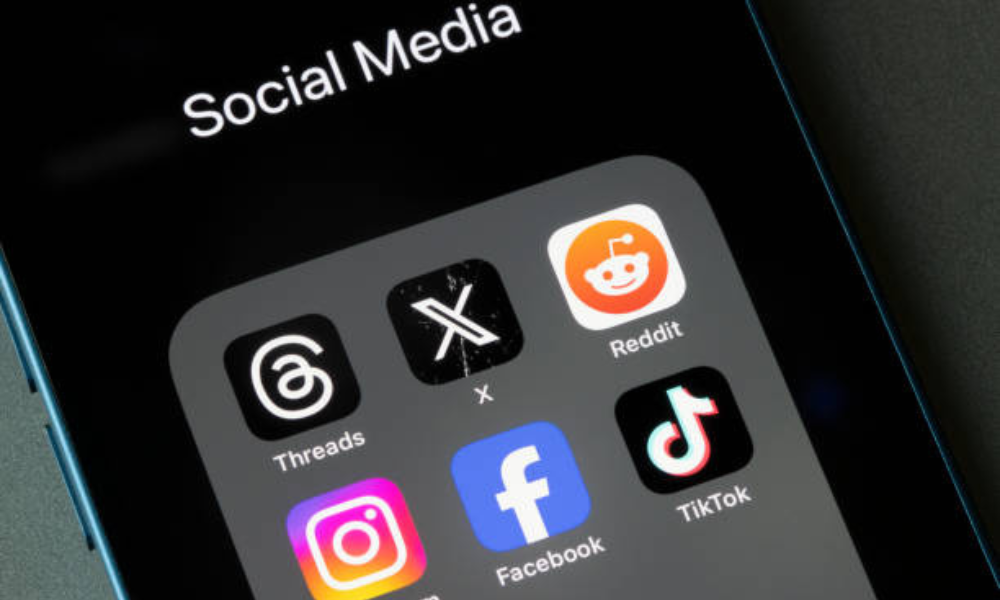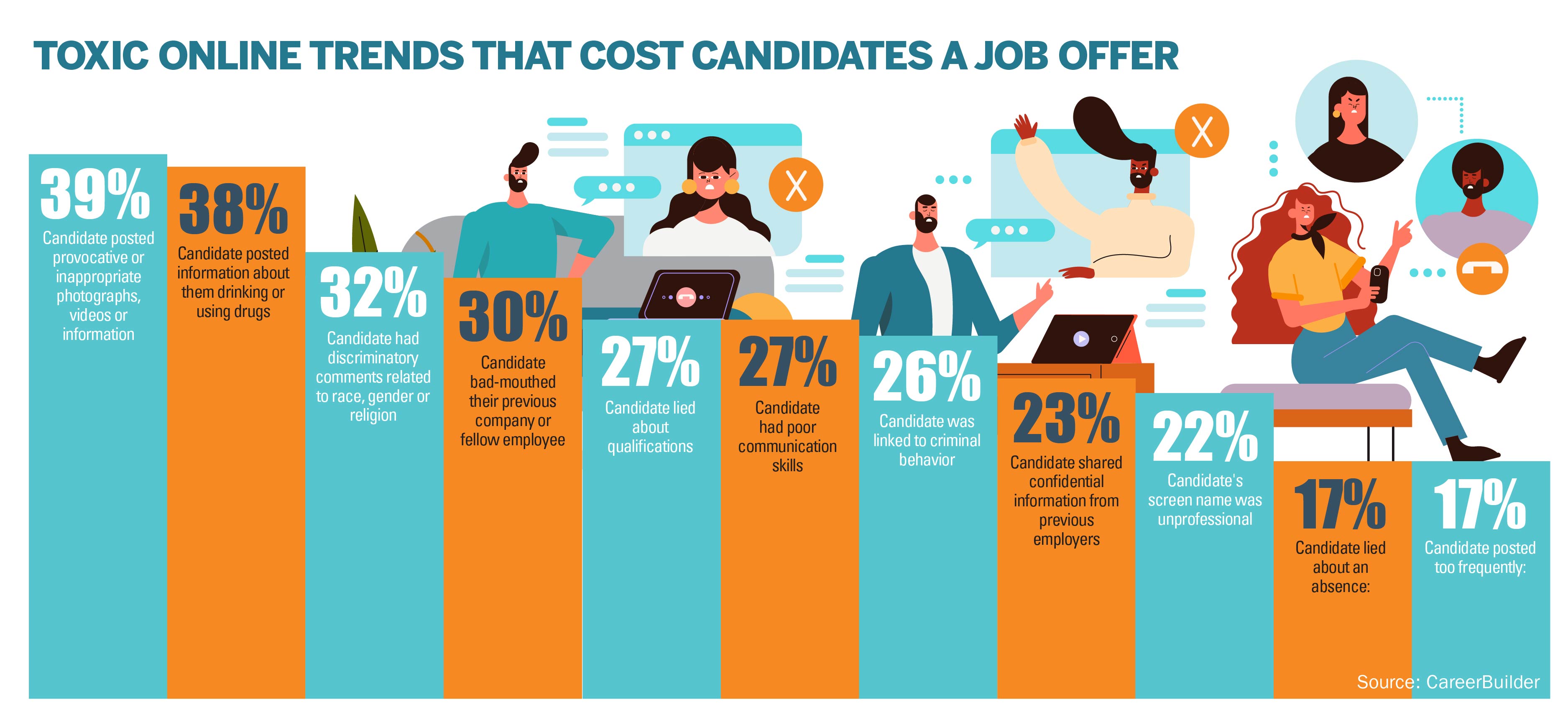
'These trends are negatively affecting how recruiters, HR professionals and hiring managers identify the right candidates'

In today’s digital age, where nothing is ever really deleted, mistakes you make online can come back to haunt you.
And, when it comes to candidate screening, HR leaders and hiring managers freely admit they enjoy a little social media vetting. Seven in 10 use social media to screen candidates before inviting them to an interview, according to a 2019 survey by CareerBuilder.
For candidates looking to secure a new role, dodgy tweets, racy pictures or even an ill-judged ‘like’ can spell disaster – as does the rise of “#CareerTok,” a worrying new trend in which people ‘rage quit’ and post their reactions online.
For HR leaders and hiring managers, the question becomes how do you vet candidates online without snooping? And, more importantly, how do you separate a silly online mistake from a potentially toxic new hire?

“Social media trends on platforms like TikTok are significantly impacting recruitment and presenting new obstacles for HR professionals,” Jasmine Escalera, career expert at Zety, tells HRD.
“The rise of #CareerTok has made TikTok a popular source of career advice, with many professionals viewing it as a more entertaining alternative to LinkedIn. However, #CareerTok doesn’t necessarily offer sound advice, and these trends are negatively affecting how recruiters, HR professionals and hiring managers identify the right candidates.”
To effectively navigate the impact of social media trends on recruitment, Escalera believes it’s essential for HR departments and leaders to stay ahead of these rapidly evolving platforms. Social media’s growing role as a source of career advice means that recruiters must be alert in understanding these trends, as they often shape candidates' behaviour and expectations.
“By staying informed, HR professionals can refine their strategies to better screen applicants, identify red flags, and ensure only the most qualified individuals advance in the process,” Escalera adds. “Anticipating these shifts not only safeguards the integrity of recruitment, but also empowers HR teams to select candidates who align with company values and long-term goals.”
For many organizations, hiring a bad fit can mean potentially culture disintegration. In remote or hybrid models, HR leaders are having to work extra hard in order to maintain a connected and authentic culture.
Speaking to HRD, Angela Champ, VP of HR at Alpine Maintenance, says that even in more relaxed firms, there’s still an expectation of professionalism – and a keen awareness of what could hurt branding and culture.
“Although the world of work has become less formal - think relaxed dress codes or more work-home integration - many organizations still want or need to maintain a certain public persona or reputation,” she explains. “The more conservative organizations, especially those who need a high level of trust between their employees and their customers in order to be successful, are wary of candidates who pose things online and in social media that conflicts with the company's desired reputation.”

Career advice and trends coming from social media platforms like TikTok may not only harm individuals trying to advance their careers, but also pose challenges for HR professionals, Escalera believes.
“Some of the most popular trends encourage behaviour that could stall career progression, damage one’s professional reputation or lead to increased turnover.”
For example, quiet quitting, where employees gradually disengage from their jobs and it eventually leads to their departure, and “QuitTok”, a trend where employees post videos documenting their resignation or being laid off.
From the standpoint of HR professionals, this kind of behaviour “contributes to a culture of disengaged employees and negatively impacts the company’s brand reputation,” she says.
Other trends, like “white-fonting,” outright try to manipulate the hiring process. White-fonting encourages job seekers to use deceptive tactics to bypass ATS systems and secure interviews for roles they may not be fully qualified for or prepared to fill. This not only complicates the recruitment process, but also raises ethical concerns about applicants engaging in these behaviours, according to Escalera.
But when does a bad post lead to legal liability? Research from CareerBuilder found that 34% of employers have reprimanded or fired an employee directly because of their internet activity.
“Social media posts regarding radical political or religious views, substance use, violence, bullying, or other extreme behaviours can have a negative impact on candidates applying for job opportunities,” adds Olivia Cicchini, HR and Employment Law expert at Peninsula.
“It’s common place for employers to conduct social media screenings as part of their hiring process to assess a candidate's character and fit within their company culture. Posts that reflect poorly on an individual's judgement or professionalism may lead employers to question their suitability for a role, particularly in workplaces that prioritize teamwork, inclusivity, and a positive public image.”
For example, many companies created distance from individuals who posted themselves engaging in the 2021 takeover of the US capital. In Canada, for example, the same was true for employees and candidates who broadcasted their participation in the Freedom Convoy protests and blockades as a result of COVID-19 vaccine mandates and other restrictions.
“This kind of content can raise concerns about the candidate's ability to represent the company effectively and maintain a respectful workplace,” adds Cicchini. “Ultimately, negative online behaviour can diminish a candidate's chances of being hired or even lead to the withdrawal of job offers.”
So, when does online research into a candidates’ history cross the line into an invasion of privacy or even discrimination? A recent incident in Australia landed one recruiter in hot water after she accidentally left a voicemail on a candidate’s phone seemingly mocking her tattoos after finding her online.
Speaking to A Current Affair, jobhunter Lily Rose-Wilson said: “The thing that really gets me is that she loved my resume, she really liked my resume, I could have been a possible candidate for that job until she saw my photos on Facebook.”
But how exactly do employers walk the line between vetting and outright snooping? Well, at the end of the day, it’s really a question of transparency.
“There is a fine line between a quick Google search of a candidate's name to see what comes up and going through every single Facebook, Instagram, or X post to dig up dirt,” Champ tells HRD. “Some years back, we entered in a candidate's name only to find out that the candidate has been previously convicted for assault.
“It was the first search result that came up - we did not need to dig into individual posts. In the candidate's application, he had stated he did not have any criminal convictions and so finding out that he hadn't told the truth was the reason the hiring manager passed on this candidate, although the assault itself may have been a barrier to hiring him in the end.”